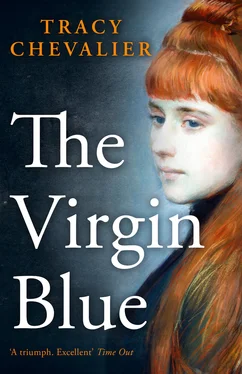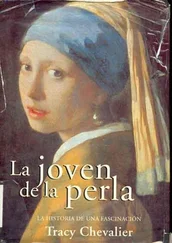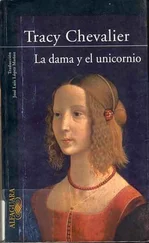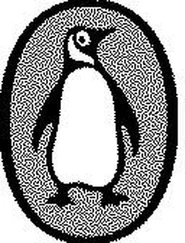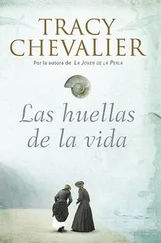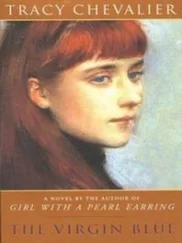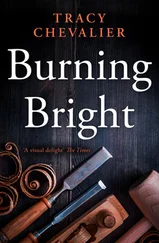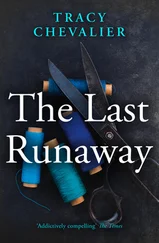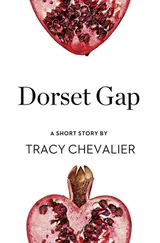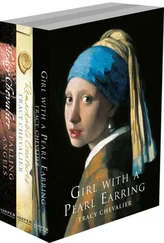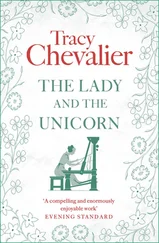She sat up abruptly, crouching on the long smooth rock of the river bed, her breasts regaining their roundness. The sounds arose out of nothing, a tinkle here and there, then suddenly joined together into a chorus of hundreds of bells. The estiver – Isabelle’s father had predicted they would arrive in two days’ time. Their dogs must be good this summer. If she didn’t hurry she would be surrounded by hundreds of sheep. She stood up quickly and picked her way to the bank, where she brushed the water from her skin with the flat of her hand and wrung the river from her hair. Her shameful hair. She pulled on her dress and smock and wound her hair out of sight in a long piece of white linen.
She was tucking in the end of the linen when she froze, feeling eyes on her. She searched as much of the surrounding land as she could without moving her head but could see nothing. The bells were still far away. With her fingers she felt for loose strands of hair and pushed them under the cloth, then dropped her arms, pulled her dress up away from her feet, and began to run down the path next to the river. Soon she turned off it and crossed a field of scrubby broom and heather.
She reached the crest of a hill and looked down. Far below a field rippled with sheep making their way up the mountain. Two men, one in front, one at the back, and a dog on each side were keeping the flock together. Occasionally a few strays darted to one side, to be herded quickly back into the fold. They would have been walking for five days now, all the way from Alès, but at this final summit they showed no signs of flagging. They would have the whole summer to recover.
Over the bells she could hear the whistles and shouts of the men, the sharp barks of the dogs. The man in front looked up, straight at her it seemed, and whistled shrilly. Immediately a young man appeared from behind a boulder a stone’s throw to her right. Isabelle clutched her neck. He was small and wiry, sweaty and very dark from the sun. He carried a walking stick and the leather sack of a shepherd and wore a close-fitting round cap, black curls framing the brim. When she felt his dark eyes on her she knew he had seen her in the river. He smiled at her, friendly, knowing, and for a moment Isabelle felt the touch of the river on her body. She looked down, pressed her elbows to her breasts, could not smile back.
With a leap the man started down the hill. Isabelle watched his progress until he reached the flock. Then she fled.
—There is a child here. Isabelle placed a hand on her belly and stared defiantly at Etienne.
In an instant his pale eyes darkened like the shadow of a cloud crossing a field. He looked at her hard, calculating.
—I will tell my father, then we must tell your parents. She swallowed. What will they say?
—They’ll let us marry now. It would look worse if they said no when there is a child.
—They’ll think I did it deliberately.
—Did you? His eyes met hers. They were cold now.
—It was you who wanted the Sin, Etienne.
—Ah, but you wanted it too, La Rousse.
—I wish Maman were here, she said softly. I wish Marie were here.
Her father acted as if he had not heard her. He sat on the bench by the door and scraped at a branch with his knife; he was making a new pole for the hoe he had broken earlier that day. Isabelle stood motionless in front of him. She had said it so quietly that she began to think she would have to repeat herself. She opened her mouth to speak when he said:— You have all left me.
—I’m sorry, Papa. He says he won’t live here.
—I wouldn’t have a Tournier in my house. This farm won’t go to you when I die. You’ll get your dowry, but I will leave the farm to my nephews over at l’Hôpital. A Tournier will never get my land.
—The twins will return from the wars, she suggested, fighting tears.
—No. They will die. They’re not soldiers, but farmers. You know that. Two years and no word from them. Plenty have passed through from the north and no news.
Isabelle left her father sitting on the bench and walked across their fields, along the river, down to the Tournier farm. It was late, more dark than light, long shadows cast along the hills and the terraced fields full of half-grown rye. A flock of starlings sang in the trees. The route between the two farms seemed long now, at the end of it Etienne’s mother. Isabelle began walking more slowly.
She had reached the Tourniers’ empty cleda , the season’s chestnuts long since dried, when she saw the grey shadow emerge skittishly from the trees to stand in the path.
— Sainte Vierge, aide-moi , she prayed automatically. She watched the wolf watching her, its yellow eyes bright despite the gloom. When it began to move towards her, Isabelle heard a voice in her head:— Don’t let this happen to you too.
She crouched and picked up a large branch. The wolf stopped. She stood up and advanced, waving the stick and shouting. The wolf began to move backwards, and when Isabelle pretended to throw the branch, it turned and skittered sideways, disappearing into the trees.
Isabelle ran from the woods and across a field, rye cutting into her calves. She reached the rock shaped like a mushroom that marked the bottom of the Tourniers’ kitchen garden and stopped to catch her breath. Her fear of Etienne’s mother was gone.
—Thank you, Maman, she said softly. I won’t forget.
Jean, Hannah and Etienne were sitting by the fire while Susanne cleared the last of their bajanas , the same chestnut soup Isabelle had served her father earlier, and dark, sweet-smelling bread. All four froze when Isabelle entered.
—What is it, La Rousse? Jean Tournier asked as she stood in the middle of the room, her hand once more resting on the table as if to secure her a place among them.
Isabelle said nothing but looked steadily at Etienne. At last he stood up and moved to her side. She nodded and he turned to face his parents.
The room was silent. Hannah’s face looked like granite.
—Isabelle is going to have a child, Etienne said in a low voice. With your permission we would like to marry.
It was the first time he had ever used Isabelle’s name.
Hannah’s voice pierced.
—You carry whose child, La Rousse? Not Etienne’s.
—It is Etienne’s child.
—No!
Jean Tournier put his hands on the table and stood up. His silver hair was smooth like a cap against his skull, his face gaunt. He said nothing, but his wife stopped speaking and sat back. He looked at Etienne. There was a long pause before Etienne spoke.
—It is my child. We will marry anyway when I am twenty-five. Soon.
Jean and Hannah exchanged glances.
—What does your father say? Jean asked Isabelle.
—He has given his permission and will provide the dowry. She said nothing about his hatred.
—Go and wait outside, La Rousse, Jean said quietly. You go with her, Susanne.
The girls sat side by side on the door bench. They had seen little of each other since they were children. Many years ago, even before Isabelle’s hair turned red, Susanne had played with Marie, helping with the haying, the goats, splashing in the river.
For a while they sat, looking out over the valley.
—I saw a wolf out by the cleda , Isabelle said suddenly.
Susanne stared, brown eyes wide. She had the thin face and pointed chin of her father.
—What did you do?
—Chased it with a stick. She smiled, pleased with herself.
—Isabelle—
—What is it?
—I know Maman is upset, but I am glad you will live with us. I never believed what they said about you, about your hair and— She stopped. Isabelle did not ask.
—And you will be safe here. This house is safe, protected by—
Читать дальше
